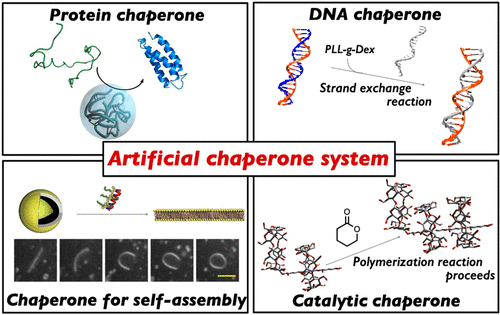当前位置:
X-MOL 学术
›
Bioconjugate Chem.
›
论文详情
Our official English website, www.x-mol.net, welcomes your
feedback! (Note: you will need to create a separate account there.)
Artificial Molecular Chaperone Systems for Proteins, Nucleic Acids, and Synthetic Molecules.
Bioconjugate Chemistry ( IF 4.0 ) Pub Date : 2020-04-26 , DOI: 10.1021/acs.bioconjchem.0c00133 Tomoki Nishimura 1 , Kazunari Akiyoshi 1
Bioconjugate Chemistry ( IF 4.0 ) Pub Date : 2020-04-26 , DOI: 10.1021/acs.bioconjchem.0c00133 Tomoki Nishimura 1 , Kazunari Akiyoshi 1
Affiliation

|
Molecular chaperones play critical roles in biological functions. They are closely involved in the maintenance of cell homeostasis, proper folding of proteins and nucleic acids, and inhibition of irreversible aggregation in denatured proteins. In addition to protein production, molecular chaperone function is widely recognized as important for peptide and protein drug delivery systems. Therefore, much effort has been made in recent decades to develop chaperone-mimetic molecules that have similar structures and biological functions to natural chaperones. These artificial molecular chaperone systems have been demonstrated to facilitate proper protein and nucleic acid folding, in addition to the formation of higher-order structures of synthetic molecules. Furthermore, the functions of these artificial systems show promising clinical applications in drug delivery and biomolecule detection. This topical review focuses on recent advances in the design, construction, characterization, and potential applications of different artificial molecular systems with distinct functional roles, such as the folding of water-soluble and membrane proteins, nucleic acids, and the self-assembly of synthetic molecules. Strategies used in the construction of some artificial molecule chaperone systems for proteins (such as pairs of amphiphilic molecules or self-assembled nanogels) and their applications as biomaterials are described. Specific examples from each design strategy are also highlighted to demonstrate the mechanisms, challenges, and limitations of the different artificial molecular systems. By highlighting the many new developments that have expanded the applications of the artificial chaperones beyond protein folding, this review aims to stimulate further studies on their design and applications.
中文翻译:

用于蛋白质,核酸和合成分子的人工分子伴侣系统。
分子伴侣在生物学功能中起关键作用。它们紧密参与细胞稳态的维持,蛋白质和核酸的正确折叠以及变性蛋白质中不可逆聚集的抑制。除蛋白质生产外,分子伴侣功能对于肽和蛋白质药物递送系统也很重要。因此,在最近的几十年中,已经做出很多努力来开发具有类似于天然伴侣的结构和生物学功能的伴侣模拟分子。这些人工分子伴侣系统已经证明,除了形成合成分子的更高阶结构外,还可以促进蛋白质和核酸的正确折叠。此外,这些人工系统的功能在药物输送和生物分子检测中显示出有希望的临床应用。这篇专题综述着眼于具有不同功能角色的不同人工分子系统的设计,构建,表征和潜在应用的最新进展,例如水溶性和膜蛋白的折叠,核酸以及合成物的自组装分子。描述了一些用于蛋白质的人工分子伴侣系统的构建策略(例如两亲性分子对或自组装的纳米凝胶)及其作为生物材料的应用。每个设计策略中的特定示例也将突出显示,以说明不同人工分子系统的机制,挑战和局限性。
更新日期:2020-04-26
中文翻译:

用于蛋白质,核酸和合成分子的人工分子伴侣系统。
分子伴侣在生物学功能中起关键作用。它们紧密参与细胞稳态的维持,蛋白质和核酸的正确折叠以及变性蛋白质中不可逆聚集的抑制。除蛋白质生产外,分子伴侣功能对于肽和蛋白质药物递送系统也很重要。因此,在最近的几十年中,已经做出很多努力来开发具有类似于天然伴侣的结构和生物学功能的伴侣模拟分子。这些人工分子伴侣系统已经证明,除了形成合成分子的更高阶结构外,还可以促进蛋白质和核酸的正确折叠。此外,这些人工系统的功能在药物输送和生物分子检测中显示出有希望的临床应用。这篇专题综述着眼于具有不同功能角色的不同人工分子系统的设计,构建,表征和潜在应用的最新进展,例如水溶性和膜蛋白的折叠,核酸以及合成物的自组装分子。描述了一些用于蛋白质的人工分子伴侣系统的构建策略(例如两亲性分子对或自组装的纳米凝胶)及其作为生物材料的应用。每个设计策略中的特定示例也将突出显示,以说明不同人工分子系统的机制,挑战和局限性。











































 京公网安备 11010802027423号
京公网安备 11010802027423号